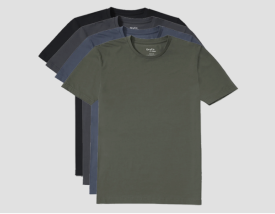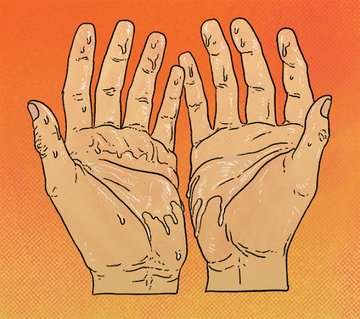Your sweat says a lot about you. If the eyes are a window into your soul, your sweat is a gateway into your body. The way your sweat looks, tastes, feels and of course, smells can give you some telling clues as to what’s going on in your body. You just have to be observant and know what these clues mean. This post will take a look at what certain perspiration characteristics mean and how you should address them.
Smelly Sweat
Let’s start with the obvious - stink. Aside from being the perfect way to leave a bad first impression, smelly perspiration can mean many things.
Typical B.O. usually just indicates you’ve got a high load of bacteria that break down certain molecules and that release chemical byproducts which smell bad. Offensive but not harmless.
However, your diet can also influence the smell of sweat. If you consume foods high in sulphur - think broccoli, asparagus, onions - there’s a chance your perspiration will carry a foul odour. Also, all you seafood lovers and alcohol connaisseurs beware - these foods and beverages can make your body odour unpleasant as well. Fortunately, this is largely harmless.
However, stinky sweat could also be a sign of a serious illness. Liver disease, kidney disease, hyperthyroidism and even diabetes can lead to malodorous sweat. With that said, if you have stinky sweat in addition to some other unpleasant symptoms, you should see a doctor for a checkup.
Salty Sweat
It probably comes as no surprise that tears are salty. When you were a kid and a teardrop rolled down your cheek, you probably lapped it up with your tongue and realized how salty it was. For some folk, their sweat can be just as salty as a tear, or pretzel or french fries - seriously.
Well here’s a fun fact: perspiration contains a good amount of salt due to your eccrine glands. The sweat coming out of the eccrine glands contains sodium (salt), along with other compounds such as ammonia, urea, and proteins. So the taste of salt in perspiration need not alarm you, even if it releases a bad body odor.
Of course, other factors come into play as well. If your perspiration tastes salty, this is a sign that your diet likely has a lot of salt in it. Your body releases excess salt via perspiration to help maintain healthy blood pressure.
Also, if you’re a fitness buff, you’re more likely to taste salt in your sweat. Intense exercise causes you to release three times as much salt as you would normally. So if you’re an endurance athlete or play a high-impact sport such as football or basketball, your sweat may taste saltier than usual. So, it’s safe to say that if your sweat is salty, it’s probably due to you putting in a good workout. Wear it like a badge of honour.
Salty sweat is rarely a sign of alarm. However, sufferers of cystic fibrosis often produce very salty perspiration in addition to other symptoms such as shortness of breath and wheezing.
Coloured Sweat
Here’s where things get weird - scary even. There are a select few among us who produce perspiration that comes out in different colours - yes different colours. Some people have blue, yellow, red, green or even black moisture.
The medical term for sweating in different colours is known as chromhidrosis, and researchers still know very little about it. People with chromhidrosis typically get this coloured perspiration from their apocrine glands, and it appears that the chemical compound lipofuscin causes it. In other cases, ingesting certain food dyes, heavy metals or medications may cause the perspiration to take on colour (usually of the substance itself).
Sweating in colour isn’t harmless - the most you might feel is slight warmth or prickly sensation at the onset of sweating. Of course, perspiring in colour can make you very self-conscious. There are treatments for chromhidrosis, however, so it’s not a hopeless “condition” to live with.
Stingy Sweat
Sometimes you can sweat so much that it hurts - literally. If you’ve felt an uncomfortable burning or tingling sensation after sweating, then you’re not alone. The feeling usually occurs on the face and occurs due to the expansion of blood vessels (vasodilation), which usually happens after heat exposure or exercise.
Remember too, that sweat accompanies heat since it’s your body’s cooling mechanism, so a bit of warmth is natural. With that said, there are other reasons why sweat can sting, some of which may require a doctor’s visit.
Dry, irritated or damaged skin can feel worse when sweat rolls along its surface. Ditto if you have a skin condition such as eczema, rosacea, or psoriasis. If you’re experiencing regular irritation when you sweat, then you should visit a dermatologist. In such cases, it’s not your sweat that’s the problem - you just need to treat the underlying skin condition that makes your skin so sensitive.
Of course, for a rare few, moisture itself is the problem. Many, ironically, are allergic to their sweat and can feel burning, itching and tingling as a result, in addition to hives and rashes. There are other skin conditions such as atopic dermatitis and cholinergic urticaria that cause profound skin sensitivity, including sensitivity to perspiration.
The main takeaway here is this: if you’re regularly experiencing irritation because of perspiration, you should visit the dermatologist or doctor. But occasional tingling or burning isn’t a cause for concern.
Sweat Talks
For the most part, it usually doesn’t tell you anything that’s cause for alarm. Generally, it’s a reflection of your diet and exercise habits, genetics or unique bodily traits that are unique to you. So if your moisture changes in any way - its odour, appearance, volume or however else - pay attention to other routines and habits.
You might want to make a few tweaks, just a small amount. And of course, if the changes are very troubling or uncomfortable, then visit your doctor. But for the most part, as long as your perspiration doesn’t disrupt your daily life, that’s a sign that everything is fine.
Want to learn more about hyperhidrosis and ways to manage it? Check out our Neat Freaks blog for helpful tips and insights to control excessive sweating.







